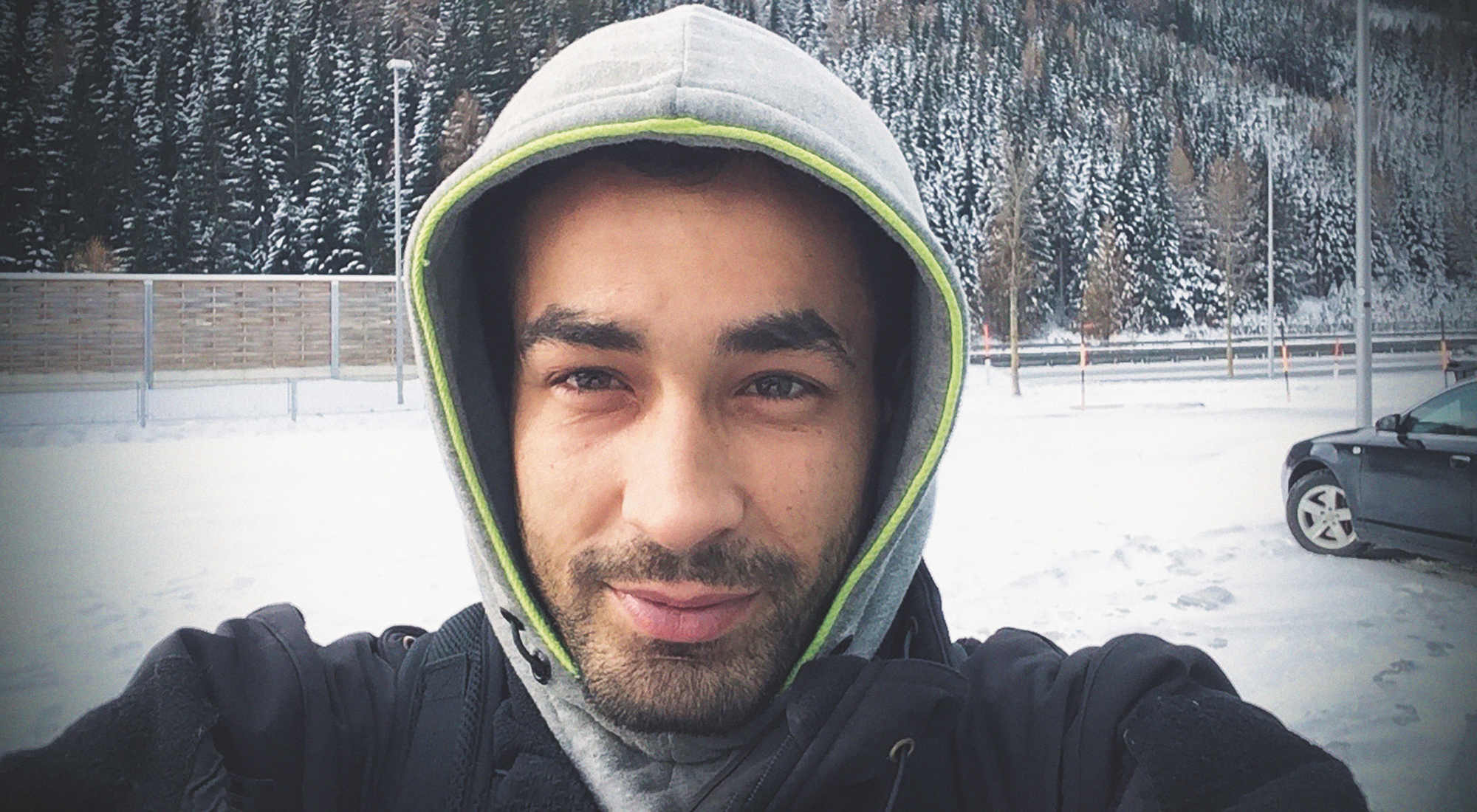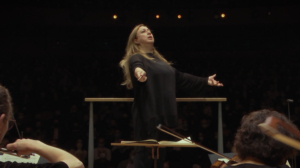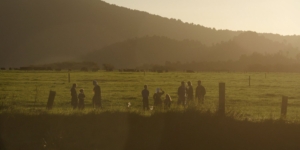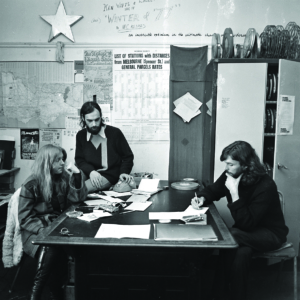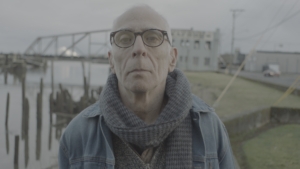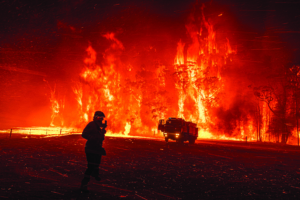Sanctuary (2019) was the result of an accidental meeting. ‘While I was making another documentary […] an asylum-seeker advocate told me the story of Khaled,’ says writer/director Kaye Harrison.
At the time, he was living in immigration detention on Christmas Island. I started talking to him and became so interested in his life story that I wanted to make a film about it.
He’d worked as an interpreter for the [War in Iraq] coalition forces […] He was part of the war against terror. Yet he was in detention, considered a potential threat to our safety.
After spending eight months in the Christmas Island Immigration Reception and Processing Centre, Khaled, despite being registered as a refugee with the Office of the United Nations High Commissioner for Refugees (UNHCR), was handcuffed and, in the company of two security guards, deported to Iraq, where he was born. However, having agreed to Harrison’s proposed film, he carried with him a tablet, which enabled him to record what followed.
That was in 2015. Over the following four years, Khaled and Harrison stayed in contact as the former, afraid for his life in Iraq, embarked on yet another quest for asylum by travelling over land and water towards the Netherlands – the country he was raised in. Together, they made Sanctuary, a documentary that tells Khaled’s story in his own words. Through an amalgam of live footage, interviews, stills and archival recordings, the film chronicles his current journey and his past, jumping between his experiences – as they unfold – and his memories. In doing so, he creates an intimate, compelling, complex portrait of both himself and his plight, driven by his uncertain future. Along the way, the film reveals the contrasting ways that various nations, from Australia and Malaysia to Greece and the Netherlands, treat refugees and asylum seekers.
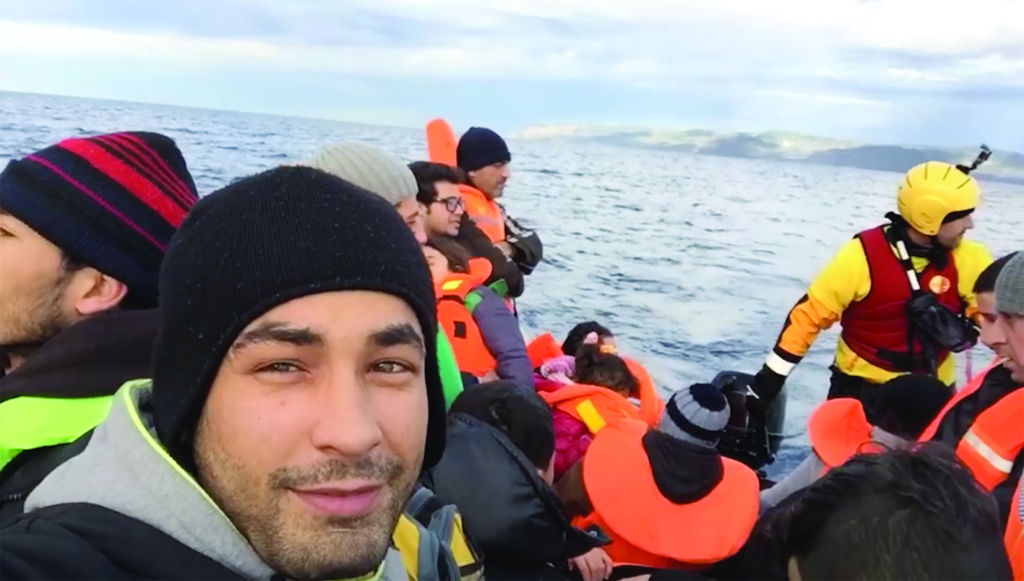
Throughout the filmmaking process, Harrison minimised her intervention and stayed off screen as much as possible. ‘It’s very hard to find asylum seekers who can tell their own stories, because they could risk their asylum claim or feel afraid for their life,’ she says.
Khaled was unique in that way. He was very articulate and very passionate about his views and willing to share them. I wanted him to speak directly to the audience, without the mediation of a filmmaker. I really wanted to focus on the story – to make it as personal as possible and make the connection between the audience and protagonist as close, as strong, as possible. The film literally gives him a voice, which, I think, has been quite absent.
There’s a lot of fear associated with refugees and asylum seekers. The narrative that they’re criminals, that they’re doing something wrong by seeking asylum, has really stuck. People buy it, but it’s actually not true. Yet neither major [Australian political] party has articulated that clearly. The whole issue – even though it’s a humanitarian issue – has become politicised. I didn’t want to go into the politics.
Although Sanctuary avoids political exposition, the dramatic impact of politics on Khaled’s life is clear. Viewers first meet him inside the Christmas Island detention centre. Establishing shots of the island’s white-sand beaches and lush jungle contrast with the centre’s stark corridors, imposing security doors and tiny cells. Speaking via live video stream, he introduces himself:
My name is Khaled […] I am from Baghdad, Iraq – just, you know, I’m not happy to go back, but no other choice. Otherwise, I’m going to have to be longer in detention. The immigration Border Force officer had a talk to me that I’m being removed in another two more days. They were happy I was going back, because they were very friendly and they told me, ‘We wish you the best of luck.’ I look at him, and ‘best of luck’, you know? You don’t know where I’m going back to.
The film shifts to Baghdad, where Khaled appears on a quiet street corner at dawn, pointing out his grandfather’s house and introducing his brother, whom he describes as his ‘only blood’ from his mother. He expresses both sadness at his return and renewed hope for escape:
I just want to […] get out of here before anything happens. I remember why I first left […] I felt like I was going to die. They were killing all the interpreters because we were seen as traitors […] It was a big risk. A very big risk. It was just way over my head.
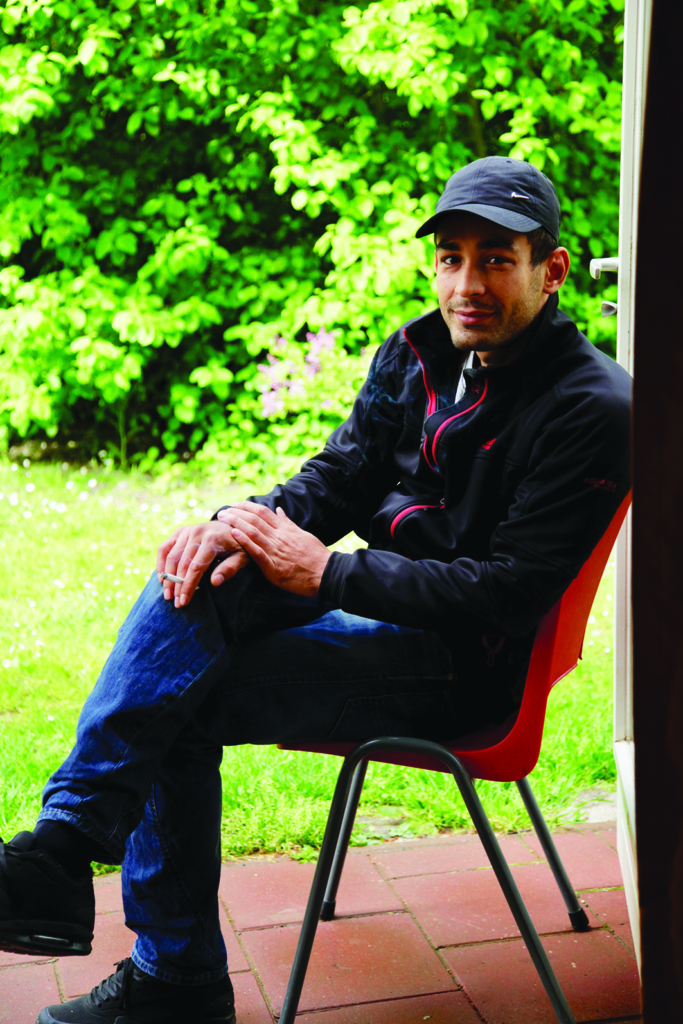
This is only the beginning of Khaled’s vicissitudinous journey. His camera travels into places often mentioned on the news, but rarely shown through the eyes of refugees and asylum seekers themselves – from a bare room in Baghdad, where he crouches in front of a heater as gunshots sound outside; to a field on the Turkish–Greek border, where he camps alone in the rain; to a crowded boat on the Mediterranean Sea. Furthermore, viewers experience them as Khaled does, an approach that creates immediacy and suspense. As Harrison has reflected:
Khaled committed to this film and he followed through – all the way through – even though he was trying to survive and was dealing with anxiety and trauma. I thought that was amazing. He’s a very faithful and loyal person, who has a lot of personal integrity […] He trusted my word and I trusted his. We were able to develop a really high level of trust between us.
This trust is striking, particularly in light of Khaled’s experiences in Christmas Island.
I think he also really trusted in the system and was perhaps very naive in many ways, which made him very vulnerable, so he could be poorly treated and not really know what was happening […] For him, Australia was all about his time in Christmas Island and the trauma of that and how it kept revisiting itself in his present life. He kept flashing back. That’s why we structured [the documentary] as a subjective recollection, rather than going through every single detail of everything that happened to him.
Among Sanctuary’s most harrowing scenes are those recounting Khaled’s memories of the detention centre. During a visit to Europe, Harrison shoots him sitting on a bed, clinging to a hot drink and staring out the window. As the shot zooms into a close-up, he recalls in voiceover, ‘The last days of me being treated really badly in Christmas Island [were] like I really wanted to die and just give up, and I didn’t want to go back to Iraq, and I didn’t want to stay in detention.’ The camera then cuts to startling CCTV footage of Khaled’s room while in custody, where four security guards push him to the floor, pinning his hands behind his back. ‘They push you. They keep on pushing you,’ his voiceover continues. ‘Because there are no eyes here on Christmas Island, no-one to see what is happening, they do as they please. They do whatever they want. I’ve got no control, no power, no nothing, in my life – my own life.’ Given that media access to Australia’s detention centres has been extremely limited, these scenes are extraordinarily enlightening and disturbing.
‘Khaled committed to this film and he followed through – all the way through – even though he was trying to survive and was dealing with anxiety and trauma … He trusted my word and I trusted his. We were able to develop a really high level of trust between us.’
—Kaye Harrison
‘I have all his psych reports from when he was in Christmas Island, because he kept all his paperwork,’ Harrison says. ‘He was diagnosed with post-traumatic stress disorder and psychologists recommended that, for any chance of recovery, he needed to be in the community.’ Prior to this, in Malaysia, where Khaled spent four years before his arrival in Australia, he had been denied basic rights. ‘He was registered with UNHCR, but couldn’t get a work permit, couldn’t study and sometimes didn’t eat,’ recounts Harrison.
He was even jailed a couple of times because the police have the power to arrest you, if they stop you on the street and you don’t have your passport and they don’t recognise you. He couldn’t get on with his life and he wasn’t safe. He was stateless.
Despite Khaled’s entrapment at the hands of various governments, his story nonetheless contains humour and glimpses into the idiosyncratic details that make up his everyday life. Sanctuary portrays him not as someone defined by his refugee status, but as an individual impacted by bureaucratic and political decisions beyond his control. As Harrison puts it, ‘Khaled doesn’t buy into all the clichés and discourses that this topic might raise. He just takes us on his journey, as it happens.’ In one scene in Baghdad, he smiles to the camera as he holds up a bullet, stating, ‘I’ve got some bullets. They were falling from the sky. That’s an AK-47 bullet.’ In another, he holds up a snow-white pigeon, describing it as ‘a beautiful bird […] They’re a pet here in Iraq. Very ugly when they’re a baby, you know, they don’t look alright,’ before giving it away. The seemingly unintentional symbolism speaks for itself.
Adding further humanity to the self-portrait is Khaled’s own history as he tells it. The film shifts continually between past and present, with the use of stills and black-and-white footage indicating the former. ‘We wanted to make sure the audience would know when we were going back in time and that we were representing Khaled’s memories, not necessarily his footage of the past,’ Harrison explains. ‘I needed to feel that we weren’t misrepresenting his story and were relating it with integrity.’
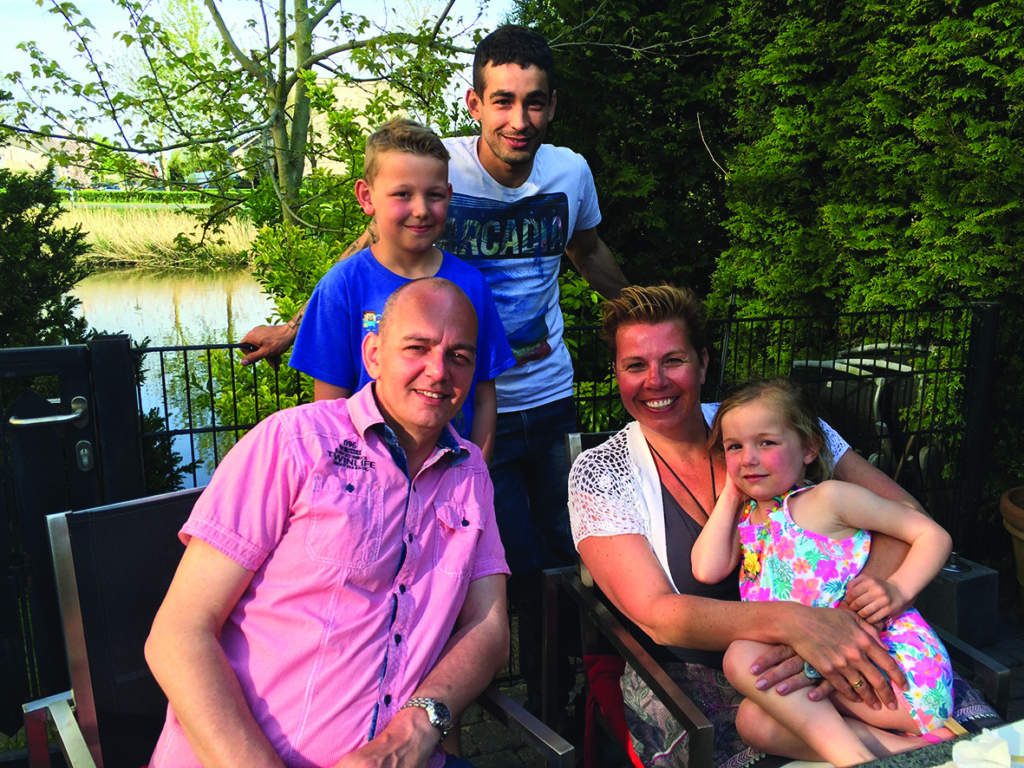
Through a combination of voiceover and photographs – which, as he explains in the film, he carries with him everywhere he goes – Khaled introduces us to his parents and reflects on his childhood. Viewers learn that his father was a journalist, who was imprisoned, tortured and, ultimately, murdered during the Iraq War, and his mother, a cancer victim who died when Khaled was a teenager. Picture after picture shows him growing up in the Netherlands – riding a bicycle through countryside, fishing by a river, surrounded by other children at school, at a fairground, standing in falling snow at Christmas time. ‘I had a good life before,’ he says. ‘Very nice, beautiful life […] very good memories […] I’m a human being, you know. I do all the fun things.’
Not only is Khaled driven by a desire to return to the Netherlands, but he’s also cognisant of the complexity his history creates. As a speaker of broken Arabic, with a Dutch accent, he’s an object of suspicion in Iraq, where, in his words, foreigners ‘blow themselves up’. Moreover, he feels out of place, socially and culturally. ‘It’s just different: very different lifestyle, different people,’ he says. ‘I want to go to Holland […] my country where I have been for a very long time, because my culture, my style doesn’t fit here in Iraq.’
Steering away from politics and exposition, Sanctuary provides a platform for a refugee’s unique voice. Harrison acts not so much as filmmaker, but as collaborator, providing a portal through which Khaled can explain his story, the way he sees and experiences it, across continents. Viewers join him as he navigates not only harsh geographic terrain, but also acutely distressing political and psychological challenges. The result is a gripping, moving, humane self-portrait that gives deep insights into its subject – obliterating the stereotypes of refugees and asylum seekers that so often dominate Western media. ‘Khaled just wants to survive,’ Harrison says. ‘He’s just trying to get on with his life. He wanted to show another perspective – that asylum seekers aren’t bad people. They just want their freedom.’
